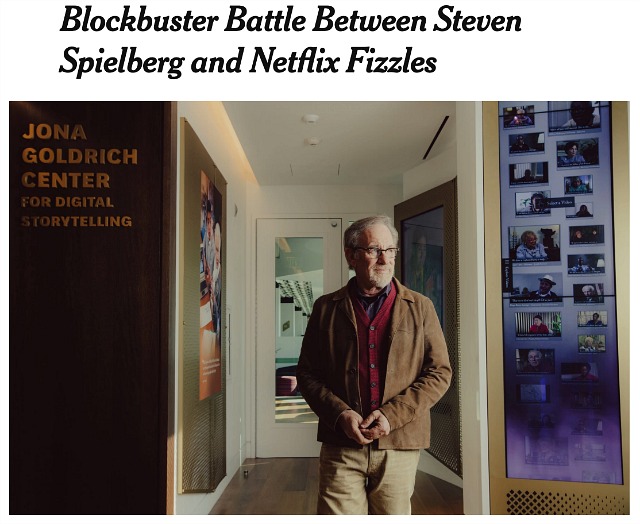Steven Spielberg isn’t exactly Terrence Malick-like in his dealings with the press, but he does like to keep his distance and generally restrict access. Which creates a vacuum, and out of that a lack of clarity and specificity from time to time. Let’s call this “the furrowed-brow Beardo effect.”
The most recent manifestation of this was a notion that Spielberg was supposed be this big enemy of streaming films being eligible for Oscars, which obviously lent itself to “Spielberg vs. Netflix.” The presumption was that Spielberg would propose and argue for a rule change at last night’s AMPAS board meeting that would exclude Netflix and others from Oscar consideration. A subhead on a 4.19 Anne Thompson Indiewire story proclaimed that “the upcoming [Spielberg. vs. Netflix] rules meeting at the Academy should be a doozy.”

Well, guess what? Spielberg didn’t show up (he was in New York, working on West Side Story rehearsals) and the notion of an anti-Netflix rule was either side-stepped or ignored by Academy hotshots. “Motion pictures released in nontheatrical media on or after the first day of their Los Angeles County theatrical qualifying run remain eligible,” the Academy said in a statement late Tuesday night.
Now it turns out that while “Beardo” worships the communal, church-like atmosphere of the theatrical experience and wants to see it thrive (as do most of us), he’s not really a Netflix opponent.
A 4.23 N.Y. Times Brooks Barnes story reports that “Spielberg’s animosity toward Netflix appears to have been acutely overstated.
Spielberg to Barnes: “I want people to find their entertainment in any form or fashion that suits them. Big screen, small screen — what really matters to me is a great story and everyone should have access to great stories.
“However, I feel people need to have the opportunity to leave the safe and familiar of their lives and go to a place where they can sit in the company of others and have a shared experience — cry together, laugh together, be afraid together — so that when it’s over they might feel a little less like strangers. I want to see the survival of movie theaters. I want the theatrical experience to remain relevant in our culture.”












